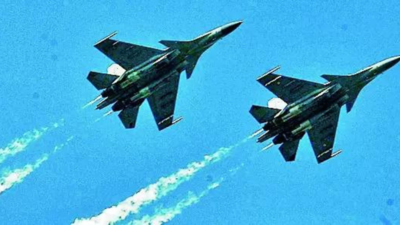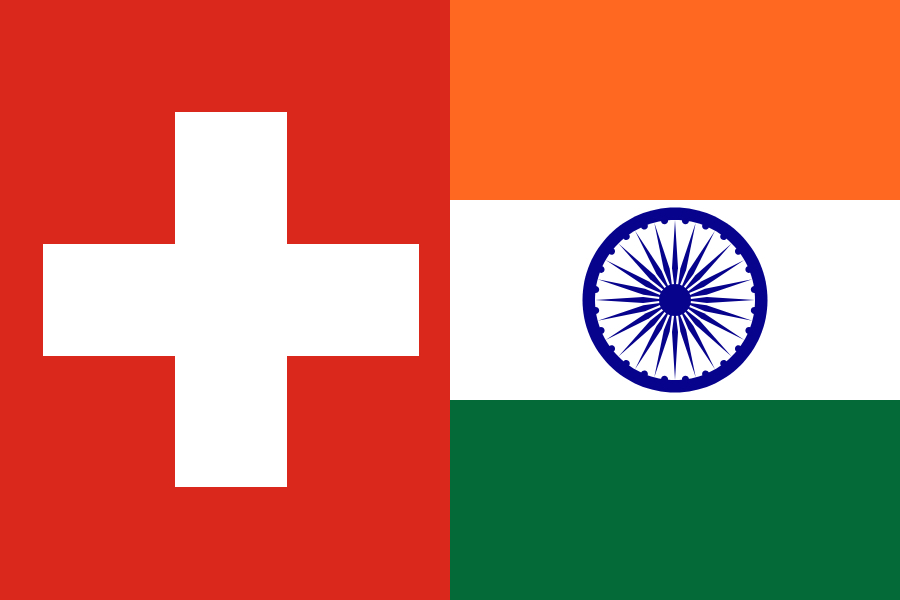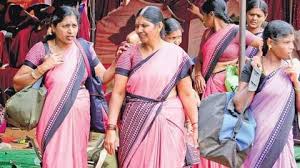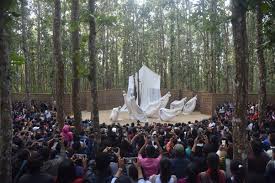Desert Knight Air Combat Exercise

- 14 Dec 2024
In News:
India, France and UAE recently kicked off a major air combat exercise called “Desert Knight” over the Arabian Sea, strengthening trilateral defence cooperation and enhancing military interoperability amid the ongoing geopolitical churn.
Key Highlights:
- What It Is: A trilateral air combat exercise aimed at improving military interoperability and enhancing combat readiness among the participating nations.
- Nations Involved: India, France, and the UAE.
- Location: Conducted over the Arabian Sea, approximately 350-400 km southwest of Karachi.
- Aim of the Exercise:
- To strengthen trilateral defence cooperation among the three nations.
- To enhance combat skills and military interoperability of the air forces involved.
- Details of the Exercise:
- Duration: The exercise lasts for three days.
- The exercise involves large force engagement and intensive combat maneuvers in a realistic operational environment.
- Aircraft Involved:
- India: Deployed Sukhoi-30MKIs, Jaguars, IL-78 mid-air refuellers, and AEW&C (Airborne Early Warning and Control) aircraft from bases like Jamnagar.
- France: Deployed Rafale jets and other aircraft from Al Dhafra airbase.
- UAE: Deployed F-16 jets and other aircraft from Al Dhafra airbase.
Strategic Significance:
- The exercise is part of India’s efforts to build military interoperability with nations in the Persian Gulf region and strengthen defence ties with France and the UAE.
- Enhances combat readiness and strengthens cooperation against both traditional and non-traditional threats.
- Reflects the geopolitical shift and growing military cooperation in the Indo-Pacific region, especially in the context of China’s expansionist activities.
- Trilateral Framework: India, France, and the UAE launched a trilateral framework in 2022, focusing on areas like defence, technology, energy, and environment.
- Previous Exercises: In addition to Desert Knight, the countries also conducted their first trilateral maritime exercise in June 2023 to enhance cooperation in maritime security.
Broader Defence Relations:
- India-France: Long-standing strategic partnership with regular joint exercises like Shakti (army), Varuna (navy), and Garuda (air force).
- India-UAE: The defence relationship has grown significantly in recent years, with regular professional exchanges, combat exercises, and staff talks. India participates in the Desert Flag exercise at Al Dhafra airbase annually.
NASA Captures Active Volcano Erupting on Jupiter's Moon Io

- 14 Dec 2024
In News:
NASA has revealed new details about Io, Jupiter’s third-largest moon and the most volcanic world in our solar system.
Overview:
- NASA’s Juno mission has revealed new insights about Io, Jupiter's third-largest moon, known as the most volcanic world in the solar system.
- Io has over 400 active volcanoes, which send plumes and lava flows into space, creating its unique, fiery surface.
Recent Discoveries and Observations:
- Fiery Heart of Io:
- NASA's Juno mission has helped solve a 44-year-old mystery regarding Io’s volcanic activity, revealing that its volcanoes are likely powered by separate magma chambers rather than a single large magma ocean.
- This discovery was made during Juno’s close flybys in late 2023 and early 2024, using Doppler measurements and precise gravity data to understand the moon’s interior.
- Volcanic Activity:
- Io's volcanoes constantly erupt, spewing lava and plumes that shape its surface. The volcanic activity was first observed by NASA's Voyager 1 spacecraft in 1979.
- Tidal Flexing: Io experiences constant squeezing due to its elliptical orbit around Jupiter, which generates immense internal heat and causes frequent eruptions.
- Scientific Insights:
- The research suggests that tidal forces from Jupiter do not create a global magma ocean inside Io, as previously thought, but instead lead to localized magma chambers that fuel its volcanoes.
- Tidal flexing is the primary cause of the immense internal energy on Io, which melts portions of the moon's interior and drives volcanic activity.
- Broader Implications:
- Understanding Other Moons and Exoplanets: Juno's findings have broader implications for understanding the interiors of other moons like Enceladus and Europa, and even exoplanets and super-Earths.
- Future Missions:
- Juno will continue its mission, with the next close approach to Jupiter scheduled for December 27, 2024, bringing it 2,175 miles above Jupiter's cloud tops. Since entering Jupiter’s orbit in 2016, Juno has traveled over 645 million miles.
Switzerland Suspends MFN Clause in Tax Treaty with India

- 14 Dec 2024
In News:
Switzerland scraps MFN status to India, dividend income to face higher tax
Key Highlights:
- Reason for Suspension:
- The suspension follows a 2023 Supreme Court ruling in India, which clarified that the MFN clause in tax treaties is not automatically triggered when a country joins the OECD if the tax treaty with that country was signed before its OECD membership.
- The Court ruled that the Double Taxation Avoidance Agreement (DTAA) cannot be enforced unless it is notified under the Income-Tax Act, 1961.
- Details of the Suspension:
- Starting January 1, 2025, Switzerland will suspend the Most Favoured Nation (MFN) clause in its DTAA with India.
- The MFN clause was part of the India-Switzerland DTAA signed in 1994.
Impact of the Suspension:
- Higher Tax Liabilities for Indian Companies: Withholding tax on dividends from Switzerland will increase from 5% to 10% for Indian companies.
- Effects on Swiss Investments in India: Swiss companies will continue to face a 10% withholding tax on dividends from India, as per the India-Switzerland DTAA.
- Potential Re-evaluation of MFN Clauses by Other Countries: Other countries may reconsider how the MFN clause is applied in their tax treaties with India, following this development.
- No Change for Other Benefits: Other DTAA benefits and investments related to the European Free Trade Association (EFTA) will remain unaffected.
Most Favoured Nation (MFN) Clause Overview:
- Definition: The MFN principle ensures that favorable trading terms given by one WTO member country to another are extended to all other WTO members, promoting non-discrimination.
- Purpose: To ensure equal treatment among trading nations by preventing discrimination, and to promote fair trade and equitable market access.
- Key Features:
- Equal treatment in tariffs, quotas, and trade barriers.
- Members must extend the best terms to all other WTO members.
- Origin: The MFN principle was established after World War II as a cornerstone of the multilateral trading system under the WTO.
- Exceptions:
- Bilateral or regional trade agreements.
- Special access granted to developing countries.
- Non-WTO members (e.g., Iran, North Korea) are not bound by MFN rules.
- Removal of MFN:
- There is no formal procedure under the WTO to suspend MFN status.
- Countries are not obligated to notify the WTO when suspending or removing MFN treatment.
Recent Development:
- From January 1, 2025, Indian companies will face higher withholding tax (10%) on income sourced from Switzerland, as a result of the MFN clause suspension.
Empowering ASHA Workers

- 14 Dec 2024
In News:
ASHAs (Accredited Social Health Activists) are critical to India's healthcare system, particularly in rural and underserved areas. Since the program's launch in 2005, ASHAs have been integral in improving maternal health, increasing immunization rates, and promoting family planning and sanitation awareness. The network of ASHAs has grown to nearly 1 million members, making it one of the largest community health worker programs in the world.
Role of ASHAs: ASHAs work as community health activists, beyond basic healthcare delivery, by:
- Promoting health awareness.
- Mobilizing local participation in health programs.
- Increasing the utilization of existing health services.
They play a central role in improving maternal and child health, and their efforts have led to increased institutional deliveries and improved immunization rates in rural India.
Challenges Faced by ASHAs: Despite their essential role, ASHAs face several challenges:
- Inadequate compensation and delayed payments, which undermine motivation.
- Heavy workloads with insufficient support and resources.
- Social and economic marginalization, often leading to a lack of recognition and respect.
- Punitive systems that emphasize compliance and record-keeping, hindering autonomy.
This environment limits ASHAs' capacity to act as independent change agents, reducing their effectiveness in driving long-term health improvements.
Psychological Empowerment of ASHAs: To address these challenges, it's essential to empower ASHAs not just financially, but psychologically. Research in motivation theory, particularly Self-Determination Theory (SDT), provides a framework to achieve this. SDT emphasizes the importance of three key psychological needs:
- Autonomy: The need for ownership over one's work.
- Competence: The need to feel capable and effective in performing tasks.
- Relatedness: The need for social connection and recognition.
By fostering these three needs, ASHAs can become more intrinsically motivated and empowered to take ownership of their roles.
Strategies for Empowerment:
- Autonomy: Giving ASHAs more control over their work and decision-making can improve their engagement and efficacy. This can be achieved by reducing rigid monitoring and compliance systems.
- Competence: Providing continuous, quality training and resources will help ASHAs build the skills and confidence needed to perform their roles effectively. Digital tools and modern training programs can be used to enhance their capabilities.
- Relatedness: ASHAs should receive direct feedback from the communities they serve, fostering a sense of connection and accomplishment. Encouraging networks among ASHAs will also help combat isolation and provide peer support.
Government Efforts and Initiatives: The Indian government has recognized the need to support ASHAs through several initiatives:
- Increased remuneration and performance-based incentives.
- Insurance coverage under schemes like Ayushman Bharat.
- Training programs for skill development under the National Health Mission (NHM).
- Village Health Mapping and digital engagement platforms to enhance outreach and feedback mechanisms.
Moving Forward:
To further empower ASHAs, several key steps should be taken:
- Formalizing employment status: Transitioning ASHAs from volunteers to formal workers with benefits can ensure more stability and recognition.
- Improving compensation: Ensuring timely and adequate payments along with performance bonuses will incentivize ASHAs and increase job satisfaction.
- Enhancing infrastructure: Ensuring ASHAs have access to the necessary tools, medical supplies, and transportation to perform their tasks effectively.
- Digital integration: Expanding digital tools for data collection and communication can streamline their work and improve coordination with healthcare systems.
Under the Sal Tree Theatre Festival

- 14 Dec 2024
In News:
“Under the Sal Tree” Theatre Festival, held annually in Rampur, Assam, promotes eco-friendly and sustainable practices in theatre while showcasing rich cultural diversity.
Overview:
- Location: Rampur village, Goalpara district, Assam
- Organizer: Badungduppa Kalakendra, a social and cultural organization
- Founded: 1998 by Sukracharjya Rabha
- Festival Focus: Eco-friendly theatre practices, cultural diversity, and sustainability
Key Features
- Unique Setting: Open-air festival under Sal trees, with no artificial lighting or electric sound systems.
- Sustainability:
- No use of plastic.
- Carbon-neutral, with eco-friendly materials such as bamboo, straw, and cane.
- Performances in natural daylight, avoiding electric lights.
- International Participation: Theatre groups from countries like Poland, South Korea, Brazil, Sri Lanka, Bangladesh, North Korea, Bolivia, and Holland have performed.
- Cultural Celebration: Highlights indigenous art forms, languages, and traditions, e.g., Rabha and Bodo plays.
Festival Activities
- Performances:
- Includes plays like “Dadan Raja” (Rabha language play), “Kindhan Charithiram” (Tamil), and “Kisan Raj” (Hindi).
- Focus on themes such as societal change and resilience of farmers.
- Workshops & Community Projects: For performing artists, promoting artistic innovation and social impact.
- Anniversary Celebrations:
- 25th anniversary celebrated with special events and book releases, e.g., “Resonance: Echoing the Spirit of Badungduppa” and “Sukracharjya Rabha on the Back Stage”.
Impact & Legacy
- Theatre Movement: Celebrates art amidst nature, breaking geographical barriers despite the remote location.
- Founder’s Vision: Sukracharjya Rabha believed in the synergy between art and nature, aiming to bring social change through theatre.
- Local Involvement:
- 20 resident artists contribute to the festival’s success.
- Festival has become a major cultural attraction in Assam, drawing thousands of theatre enthusiasts.
